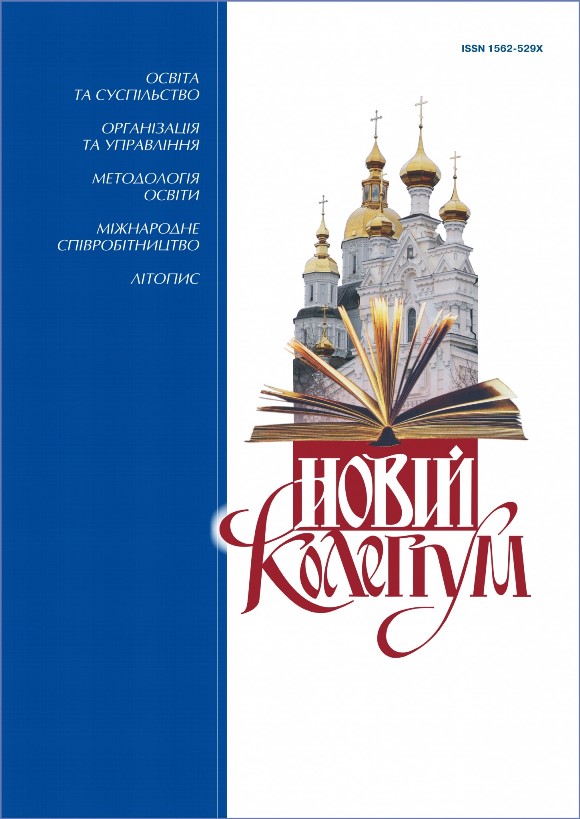Sociological methods for solving current practical issues of higher education: action research
DOI:
https://doi.org/10.30837/nc.2020.3.21Keywords:
action research, higher education, sociological researchAbstract
The purpose of this article is to review the characteristics and principles of research in action and actualization in this context of sociological methods and relevant research competencies of teachers. Research in action is presented as one that can be used by lecturers to obtain the necessary information about their current students, which is necessary to compensate for socio-cultural barriers to the introduction of student-centered education, choice of teaching methods, increase student motivation, general and subject competencies. Demonstrated that action research are relevant in the perspective of socio-cultural and other aspects (globalization, economic) changes in modern society.The most important features and principles of action research in the field of education are presented. It is emphasized that their purpose is determined not by the priorities of science to create a universal pedagogical theory, but by the specific tasks of practice in a particular audience or class. The principles of action research are developed and widely studied in sociology, directly related to the methods of obtaining data - surveys, interviews, focus group interviews, document analysis, observation, as well as the formulation of the research problem, setting goals and objectives of the study, and questions validity and reliability of research data. Action research procedures demonstrate the use of sociological methodology for the tasks of direct educational practice, so action research as a field of educational activity is not yet widely represented in Ukraine, can receive support and resources from the sociological field. The interaction of action research and sociology is demonstrated through the author's experience in studying students' expectations from the course. The conditions for distance learning during a pandemic are becoming a new field for the development of research practices in action. The task of creating an appropriate learning environment, adequate to the objectives of the course and the nature of the student audience, are more noticeable in the distance, when communication sessions with students are limited in time, and meeting through the screen narrows the field for observing students in the classroom and using teaching intuition.
References
Арбєніна В., Сокурянська Л. Стан навчальних практик сучасного студентства як соціокультурний бар’єр модернізації вищої школи України // Укр. соціол. журнал. 2012. (1-2). С. 27-47.
Социокультурные барьеры модернизации высшей школы Украины : коллект. моногр. / В. С. Бакиров, Л. М. Хижняк, Л. Г. Сокурянская [и др.] ; под ред. В. С. Бакирова ; Харьков. нац. ун-т им. В. Н. Каразина. Харьков : ХНУ им. В. Н. Каразина, 2015. 424 с.
Капосльоз Г. Проблемні питання організації наукових досліджень в інтересах навчальних закладів та органів управління освітою у Збройних Силах України // Військова освіта. 2018. 37(1). С. 147-157.
Кот М. Професійна мотивація студентів як спосіб активізації навчання // Збірник наук. праць [Херсонського державного університету]. Педагогічні науки. 2017. (75 (1)). С. 130-132.
Ласаускене Й., Мальцене З. Использование проектного метода в структуре педагогического исследования // Наук. записки [Кіровоград. держ. пед. ун-ту ім. Володимира Винниченка]. Сер.: Педагогічні науки. 2013. 121 (1). С. 18-24.
Сорока Ю.Г. Практикуючи студентоцентровану освіту: діагностичні аспекти студентських очікувань // Вісник Харк. нац. ун-ту ім. В.Н. Каразіна. «Соціологічні дослідження сучасного суспільства: методологія, теорія, методи». 2014. № 1101. С. 190-194.
Паніна Н. Технологія соціологічного дослідження : курс лекцій. Київ : Ін-т соціології НАН України, Вища шк. соціології. 2-е вид., доповн. Київ : Ін-т соціології, 2007. 314 с.
Хижняк Л. Модернізаційний потенціал вищої школи України: соціокультурний та управлінський контексти // Міжнар. наук. форум: соціологія, психологія, педагогіка, менеджмент. 2013. №13. С. 5-12.
Blackberry G., Kearney, J. Glen M. Developing an interpretive learning framework for understanding action research projects. Educational Action Research . 2019. 27:2. Р. 318-330.
Carr W., Kemmis S. Educational Action Research: A Critical Approach. In Noffke S. & Somekh B. (Eds.). The Sage Handbook of Educational Action Research. London : Sage, 2009.
Cochran-Smith M., Lytle S. In Noffke, S. & Somekh, B. (Eds.). The Sage Handbook of Educational Action Research. London : Sage, 2009.
Cook-Sather A., Des-Ogugua C., Bahti M. ( Articulating identities and analyzing belonging: a multistep intervention that affirms and informs a diversity of students. Teaching in Higher Education . 2018. 23:3. Р. 374-389.
Darwin S., Barahona M. Can an outsider become an insider? Analysing the effect of action research in initial EFL teacher education programs // Educational Action Research, 2019. 27:5. Р. 709-725.
Elliott J. Building educational theory through action research. In Noffke, S. & Somekh, B. (Eds.). The Sage Handbook of Educational Action Research. London : Sage, 2009.
James F., Augustin D. Improving teachers’ pedagogical and instructional practice through action research: potential and problems // Educational Action Research. 2018. 26:2. Р. 333-348.
Kincheloe J. Teachers as researchers: Qualitative inquiry as a path to empowerment. New York : Falmer, 2003. 200p. [Електронний ресурс]: http://www.nc-net.info
McNiff J., Whitehead J. All You Need To Know About Action Research. London : Sage, 2011.
Michalova N., Yusfin S., Polyakov S. Using action research in current conditions of Russian teacher education // Educational Action Research. 2002. 10:3. Р. 423-448.
Pavlova M., Pitt J. Action research as an effective way of developing educational policy // IDATER, 2001. Conference. Loughbough : Loughbough Univercity.
Somekh B. Action Research: A Methodology for Change and Development. Maidenhead McGraw-Hill, 2011.
Zimmer W., Keiper P. Redesigning curriculum at the higher education level: challenges and successes within a sport management program // Educational Action Research. 2020. Feb. Р. 1-16.
Lewin K. Action research and minority problems // Journal of social issues, 1946. 2(4). Р. 34-46.

